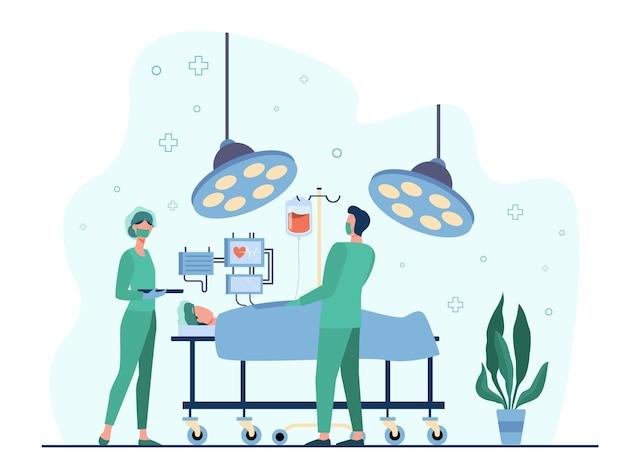If anyone in your family has a condition of Osteoarthritis or Rheumatoid arthritis, or if someone in your home has recently experienced a hip fracture, they may go through hip surgery. In most hip joint ailments or injuries, surgery is often a solution.
Hip Surgery – The Difference in Approaches
When it comes to hip surgery, there are two types of procedures; anterior approach and posterior approach. The anterior approach involves minimally invasive surgery performed at the front side of the hip without detaching muscles. It has a faster recovery rate and is accompanied by reduced pain, less muscle damage, and shorter hospital stays as compared to the posterior one. Given the lessened intensity of post-surgery factors, it is often favored for younger active patients who are more motivated to get stable sooner.
Comparing posterior to the former approach, patients experience far more intense pain and require a longer time to recover in posterior surgery, given the detaching and reattaching of muscle and tendons to get to the point. It involves an incision at the back of the hip. Considering the detailed procedure, it offers excellent accessibility and surgical stability, assisting in addressing numerous hip issues. Hence it is favored by the surgeons.
How Long Do You Need a Caregiver After Hip Surgery?
Regarding the question ‘how long do you need a caregiver after hip surgery?’ there is a difference in answers given the distinct approach used in both procedures. In anterior-side surgery, a patient may need assistance with some tasks at home for about seven to ten days. On the other hand, in the posterior one, the need for help spans up to four weeks with multiple tasks.
Regardless of the day count, having support and help after post-surgery days in both approaches is imperative to heal and stabilize properly. It becomes tenfold crucial in the case of the elderly, considering their depreciated physical state. Whether it is you going under hip surgery or any of your loved ones, understanding the several aspects of this surgery’s recovery is essential to being a quality caregiver. Let’s dive into what entails the recovery factors of hip surgery.
Read More: The Importance of Companion Care for Elderly People
Recovery Period and Aspects of Healing Following Hip Surgery
Immediate Post-Surgery Care
The first few days after hip surgery are critical for a patient’s recovery. During this time, a caregiver plays a vital role in providing immediate post-operative care. This includes helping the patient get out of bed, assisting with personal hygiene, and administering medications as prescribed.
Moreover, caregivers are responsible for ensuring the patient follows the surgeon’s instructions, such as weight-bearing restrictions and wound care. Having a caregiver during this initial period helps minimize the risk of complications and enhances the patient’s overall comfort.
Mobility Assistance
Regaining mobility is a primary goal after hip surgery. However, it takes time for patients to resume their regular activities independently. A caregiver can provide valuable assistance during this phase. They can help with exercises and physical therapy sessions, aid in walking with crutches or a walker, and ensure the patient avoids any sudden movements or falls.
Caregivers may also accompany the patient to medical appointments and provide necessary transportation, ensuring that all follow-up visits are attended punctually.
Medication Management
After hip surgery, patients often require pain medications, antibiotics, and other prescribed drugs to manage pain and prevent infections. Caregivers play a crucial role in medication management, ensuring that medications are taken at the right time and in the correct dosage.
They can also monitor any side effects or adverse reactions and communicate them to the healthcare team. By ensuring medication adherence, caregivers contribute significantly to the patient’s recovery process.
Emotional and Psychological Support
Hip surgery and the subsequent recovery period can be emotionally challenging for patients. It is common for individuals to experience feelings of frustration, helplessness, and anxiety during this time. Caregivers provide emotional support by actively listening, offering encouragement, and engaging in meaningful conversations. They can also help alleviate stress by taking care of daily household chores, enabling the patient to focus on their recovery without additional concerns.
Safety and Fall Prevention
Fall prevention is a crucial aspect of the recovery process after hip surgery. Caregivers play a pivotal role in creating a safe environment at home, eliminating potential hazards, and ensuring that the patient follows recommended precautions.
They can assist with mobility aids, such as handrails and grab bars installation, and provide constant supervision to prevent accidents. By prioritizing safety, caregivers contribute to the patient’s overall well-being and reduce the risk of re-injury.
Transitioning to Independence
The length of time a patient needs a caregiver after hip surgery depends on various factors, including the type of surgery performed, the patient’s overall health, and their progress during the recovery process. In general, most patients require assistance for several weeks to a few months.
As the patient’s strength and mobility improve, the caregiver’s role gradually transitions from providing constant support to offering occasional help and guidance. The timeline for this transition is determined by the healthcare team, who evaluate the patient’s progress during follow-up visits.
Read More: How to Become a Certified Caregiver for Aging Adults
Caring for Seniors After Hip Surgery
Medication Management
Older adults may be taking multiple medications for various health conditions. Caregivers must ensure proper medication management, including organizing pillboxes, administering medications at the correct times, and monitoring for any adverse effects or drug interactions.
Fall Prevention
The risk of falls is higher among the elderly due to age-related balance issues and decreased coordination. Caregivers should focus on creating a safe environment, removing tripping hazards, and providing assistance during mobility and transfers to reduce the risk of falls.
Cognitive Impairment
Some elderly individuals may have cognitive impairments, such as dementia or confusion, which can affect their ability to follow instructions and participate actively in their recovery. Caregivers should adapt their communication strategies, use clear and simple instructions, and provide frequent reminders and assistance as needed.
Home Adaptations
Depending on the elderly person’s living situation, modifications to the home environment may be necessary to ensure safety and accessibility. This could include installing handrails, removing rugs, improving lighting, or arranging furniture for ease of movement.
Chronic Conditions
Elderly patients may have pre-existing chronic conditions, such as arthritis, osteoporosis, or cardiovascular issues. Caregivers should be aware of these conditions and work closely with the healthcare team to ensure appropriate management and adaptation of care plans.
Must-have Equipment for Post-Operation Assistance
In addition to having a helping hand from the caregiver, there are some pieces of equipment that, if you keep them at home, can offer you and your caregiver much-needed relief in many tasks. Let’s have a look at this list:
- Raised Toilet Seat
- Shower Chair or Bench
- Grab Bars
- Reacher/Grabber Tool
- Long-Handled Shoe Horn
- Sock Aid
- Dressing Stick
- Leg Lifter
- Walker or Crutches
- Cane
- Ice Packs or Cold Therapy Machine
- Compression Stockings
- Bedside Commode
- Stool or Small Chair with Backrest for Shower
- Raised Chair or Recliner
- Overbed Table
- Non-Slip Mats
- Assistive Devices for Daily Activities
- Physical Therapy Equipment
- Mobility Aid Accessories
Read More: The Difference Between In Health Care and Companion Care
THE CORE
Hip surgery is a significant medical procedure that requires proper care and attention during the recovery period. Caregivers play a crucial role in ensuring a smooth recovery, providing comprehensive and seamless assistance throughout.
While the length of time one may need a caregiver after hip surgery can vary, their presence significantly contributes to a successful recovery. Patients and their caregivers should work closely with the healthcare team to determine the appropriate duration of care needed.



